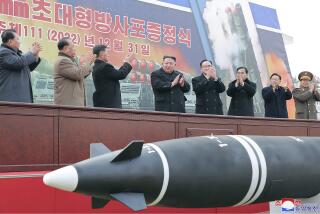Dollar Sinks on Korean Bank Plan
- Share via
The dollar Tuesday suffered its biggest one-day drop in more than six months against the euro and also fell against at least 30 other currencies, after the Bank of Korea said it planned to boost its non-dollar capital reserves.
South Korea’s central bank, which has $200 billion in reserves, said in a report to parliament that it would seek to better diversify its holdings. That could lift demand for euro-denominated securities and those of other nations, at the expense of dollar-denominated securities.
The country’s reserves are the world’s fourth-biggest, behind those of Japan, China and Taiwan, according to Bloomberg data.
South Korea’s report “is a wake-up call,” said Robert Lynch, currency strategist at BNP Paribas in New York. Diversification of foreign-currency reserves by investors outside the U.S. “is going to be an issue for the dollar over the next several years,” he said.
For decades, many governments held most of their reserves in dollar-denominated securities, particularly U.S. Treasury bonds. But the dollar’s slide since early 2002 has devalued foreigners’ holdings of U.S. assets and encouraged investors worldwide to look to other countries’ securities as a way to bolster their portfolios.
The Bank of Korea report was distributed to members of the parliament’s finance and economy committee in advance of a debate this week. The plan must be approved by lawmakers.
Last month, a survey sponsored by Royal Bank of Scotland reported that almost 70% of 56 central banks worldwide said they planned to increase the level of their reserves held in euro-denominated securities.
The euro jumped to $1.326 on Tuesday in New York from $1.307 on Friday.
More to Read
Inside the business of entertainment
The Wide Shot brings you news, analysis and insights on everything from streaming wars to production — and what it all means for the future.
You may occasionally receive promotional content from the Los Angeles Times.










